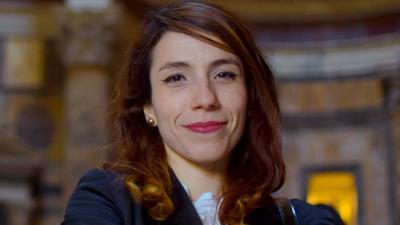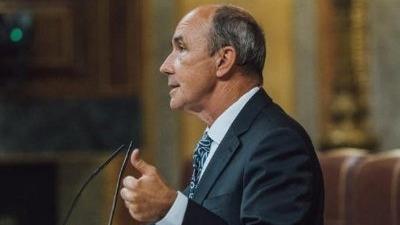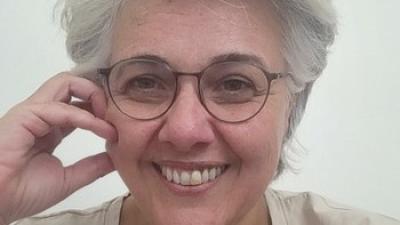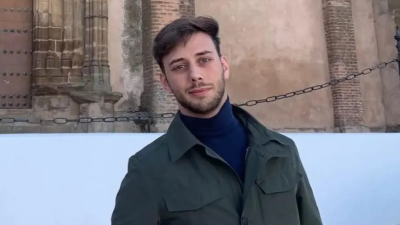It seems that in the West they don’t understand that they are not talking to democracies where citizens have rights, but to dictators who are willing to kill their own people.
Estefanía Meléndez is a Venezuelan opposition activist who, during Venezuela's presidential crisis in 2019, was appointed by the National Assembly as Venezuela's ambassador to Bulgaria with "concurrent" work to North Macedonia, Montenegro and Albania, and special envoy to Ukraine. She currently works as an international analyst and is an expert in Russian Influence analysis.
Alvaro Peñas: What are Maduro’s main supporters abroad?
Estefanía Meléndez: Maduro’s main supporters are Russia and Iran. However, unlike Russia, which is openly outspoken, Iran maintains a more discreet relationship in the media, although they have taken over a large part of the oil sector's operations and, for example, have been in charge of refurbishing the refineries.
How important is the relationship between Russia and Venezuela?
For Russia, Venezuela is one of its great alliances, not only because of its resources, but also as a means to expand its propaganda using media outlets such as Telesur. The Russian media talk a lot about Venezuela and, for example, gave enormous coverage to the conflict in Guyana. It is emphasised that Venezuela is a very rich country and this serves to reaffirm Russia’s projection as an international power.
On the other hand, Maduro has always been very clear about his support for Russia, a support that has only increased since the beginning of the invasion and even high-level visits have increased. Indeed, the first phone call Putin received after the invasion was from Maduro. It is true that at the start of the war there was some nervousness about economic ties with Russia and the problem that sanctions could cause, but the regime is now very comfortable.
Is it perhaps a consequence of the appeasing US policy towards Venezuela?
The United States has delivered all its pressure cards by removing all sanctions on Maduro. A few weeks ago a Russian oil tanker arrived in Venezuela. That oil is diluted with Venezuelan oil and finally, as Venezuelan oil, sold to the United States. The European and American leaders who have removed the sanctions should think that, in the end, benefiting Maduro also benefits Russia. In other words, on the one hand, sanctions are placed on Russia, and on the other, they are allowed to circumvent those sanctions through Venezuela.
Juan Gonzalez, a White House security adviser of Colombian descent, was the one who lifted the sanctions on Maduro and, in exchange for several Americans and Venezuelan political prisoners, handed over his narco-brothers and Alex Saab, Maduro’s front man who was also trained in Russia. In fact, there was a huge international media campaign in favour of his release, which in the end came very cheap for the regime.
And the European position?
Europe’s position, and especially Spain’s, has been very permissive towards the Maduro regime. That is why I am surprised to hear what Josep Borrell says about Venezuela and Cuba. It seems that in the West they don’t understand that they are not talking to democracies where citizens have rights, but to dictators who are willing to kill their own people. It is the same thing that is happening with Russia. There are many countries that have shown terrible naivety towards Putin and now we are seeing the consequences.
So the West’s main problem in dealing with these threats is its lack of resolve?
Yes, because this new axis of evil, which includes Russia, China, Iran, North Korea, Cuba, Venezuela and Nicaragua, is very clear about its position and aligns itself on the geopolitical chessboard. But the West does not do so with the same determination. When I was in the interim government it was very difficult to explain to our allies that Venezuela was part of the Russian game and they tried to look at Maduro with different eyes. And all this despite the fact that on the other side they are clearly saying what their plans are.
However, despite his very clear statements, his propaganda says otherwise and continues to convince many.
That’s right, but if you want to be clear about his intentions you only have to listen to Medvedev. He is not a madman, but clearly expresses the Kremlin’s intentions: Ukraine does not exist and Russia’s borders are yet to be defined. What happens is that the media machine is huge, it knows how to sell disinformation very well and tells everyone what they want to hear. Even if Russia loses the war in Ukraine, they will somehow manage to sell the defeat as a victory.
How do you view the expansion of the BRICS?
I view it with great concern because what started as an economic initiative of the Global South, even if Russia has nothing to do with it, is becoming an axis of geopolitical confrontation. Venezuela is going to be its new member after Argentina, fortunately, decided after Milei’s victory not to join the BRICS. This was one of the themes of Lavrov’s last visit to Venezuela, and it is a new goal for Maduro because it legitimises his regime.
You mentioned earlier that Maduro feels very comfortable. Would the situation in Venezuela change in the event of a Russian defeat?
Regardless of external factors, the Venezuelan regime maintains its stability thanks to a brutal exercise of violence. If Russia loses, it will be a blow to Venezuela, but it will not be enough to shake the regime unless strong pressure is applied from outside. In any case, regardless of what happens in Ukraine, it is very difficult to bring about real change in Russia because the opposition is disjointed and a large part of Russian society has a mentality inherited from the Soviet Union. The only possibility of real change is for the regime itself, the people closest to Putin, to withdraw their support. And, obviously, this will not happen because of any democratic yearning, but merely because of the economic interests of oligarchies that do not want to lose power. However, what happened with the Prigozhin riot showed that Putin’s power is not as strong as it appears, and this is very important because it dismantles the image of the all-powerful leader. That is his Achilles’ heel, that the Russian people see him as a weak leader.
In the West, although there is a certain consensus that Ukraine must be supported, there are many who do not dare to consider a total defeat of Russia, to humiliate Russia. Showing this weakness to Putin is like pouring gasoline on a fire. The same applies to Venezuela's domestic politics. Now we have María Corina Machado who is directly opposing the regime, but we see how they are preventing her from standing in the elections. Venezuelans are helpless because Maduro will not allow any threat to his power. Venezuela, like Russia, is playing on fear and propaganda, but that can backfire if both from within and without, fear is lost and they are confronted.
Read also
Francisco José Contreras: “The renewal of the West is the historic task that the New Right must take on”
Francisco José Contreras is Professor of Philosophy of Law at the University of Seville and was a deputy for VOX during the last legislature (November 2019-July 2023).
Álvaro Peñas
Interview with Yobana Carril
“I never thought that in Spain I would see that the same crime committed by two individuals would be punished differently depending on their sex”
Álvaro Peñas
“There is much more that unites Spain and Hispanic America than what differentiates us”: An Interview with Manuel Fuentes Márquez
In the television programme El mejor de la historia, broadcast by La 1 of Radiotelevisión Española, Hernán Cortés is described by one of the participants as an “animal” and an “impressive murderer”. The black legend is widespread in Spain, and Hernán Cortés, like other conquistadors, is portrayed in a very negative light. To discuss his historical relevance and the many myths that surround him, I spoke to Manuel Fuentes Márquez, a historian, researcher, and author of the Spanish history website Libros y Lanzas.














Comments (0)